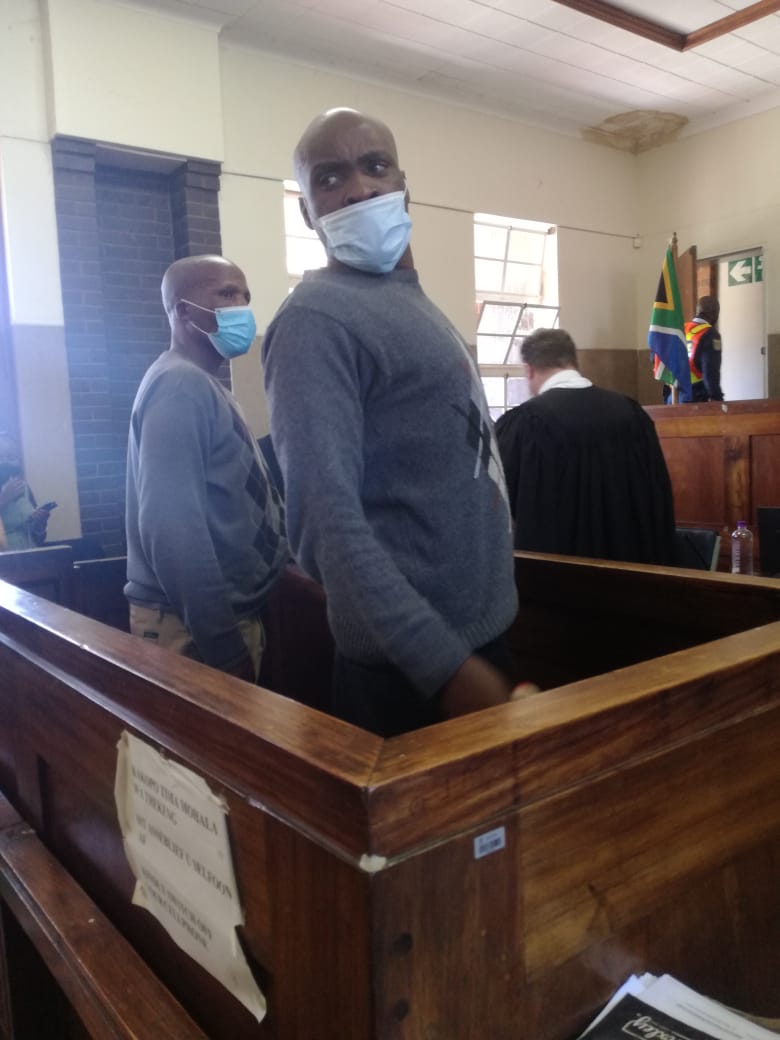Judgment in the bail application will be handed down on Thursday.

What should have been a straightforward bail application for the men accused of murdering Brendin Horner ended up in a two-day long series of arguments with newly laid allegations of police involvement, bribes and death threats to a witness.
Sekwetje Mahlamba and Sekola Matlaletsa – the men charged with Horner’s murder who was strangled to death on a farm in Paul Roux, the eastern Free State, on 1 October – spent another day in the dock in the Senekal Magistrate’s Court on Tuesday.
The court hearing dealt with the cross-examination of one of the investigating officers in the case as well as the closing arguments for the bail application of both accused.
From these court exchanges, a number of new narratives emerged as both the State and defence teams battled for a dominant and accepted version of events.
Bribes and police involvement
Legal Aid attorney Machini Motloung, for Matlaletsa, told the court his client’s wife had allegedly been called by a police officer who offered to help him get released from custody.
According to Motloung, the unknown police officer told Matlaletsa’s wife that for R20 000 or R30 000 he could ensure he was released.
One of the investigating officers, Captain Gerhardus Myburgh who was still on the stand, said this information was worrying and Matlaletsa’s wife should let police know so they could investigate it and trace the number from which the call was made.
Motloung also spent time focusing on the crime scene and the evidence found, questioning the possibility of police involvement.
He asked Myburgh about police involvement in stock theft syndicates to which he confirmed there was information police officers were complicit in the syndicates.
Motloung then pointed out the manner in which Horner was found, the fact there was a knife placed on his cap found near his body and that nothing of substance was taken.
He asked if there could have been police involvement in his murder.
Myburgh retorted should police officers be implicated, they would be dealt with, but there was no evidence or information pertaining to their suspected involvement.
Death threat
The court earlier heard one of the witnesses, who gave information to the police, had allegedly been threatened by a family member of Matlaletsa.
Myburgh told the court the independent witness was allegedly threatened to keep quiet and stop providing information to investigators.
The witness was allegedly told if she continued to give information to the police, she would not see December.
Myburgh added a process was underway to have the witness placed in witness protection.
He later told the court the witness was not threatened directly, but rather she was told by someone else the threat had been made.
During closing argument, Motloung asked the court to consider whether the story about the threat was not concocted in an attempt to show the accused would interfere with witnesses if released on bail.
“I humbly submit that it’s so incomprehensible for an experienced investigating officer to provide evidence of such poor quality,” he said.
The witness, who claimed she received the death threat, is the same one who was allegedly seated with the accused at a tavern in Paul Roux when both Mahlamba and Matlaletsa were alleged to have detailed assaulting a white person on a farm before tying him to a fence pole.
News24 previously reported these details matched the crime scene, which led to their arrests.
There were two independent witnesses who allegedly heard the accused boast about the crime at the tavern on the same day Horner’s body was found.
The other witness was sitting in close proximity to both accused and overheard them talking about assaulting a white man on a farm.
The State placed it on record the two independent witnesses did not hear the same conversation, but rather two different conversations at different times about the same incident.
“We have two independent witnesses that testified how the accused immediately located themselves in the crime,” the prosecutor, who asked the court not to be identified, said.
Weak circumstantial case
The attorneys for both accused told the court the State’s case was weak and based on nothing more than circumstantial evidence.
This after DNA samples taken from Horner’s bakkie could not be matched to the accused.
News24 previously reported DNA samples collected from the bakkie, which was found around 13km from the crime scene, by a private investigator had been analysed by a private laboratory.
The DNA profiles of three different men were found. Swabs of the accused were subsequently taken and tested against the profiles. The DNA from one of them did not match, while the swab for the other was defective and therefore came back as inconclusive.
Private attorney Joseph Kgoelenya, appointed by Legal Aid for Mahlamba, said there were myriad issues that pointed toward the “hopeless” nature of the evidence tendered by the State.
Kgoelenya said there was no physical evidence in the way of forensics or eyewitnesses that linked Mahlamba to the crime.
“What the State has now is weak circumstantial evidence,” he said, going as far as calling the evidence non-existent.
Kgoelenya added Mahlamba was not found in possession of Horner’s wallet or cellphone and forensics on the bloodstained clothes seized from him when he was arrested were still outstanding.
Mahlamba claimed the blood stains were from a sheep he slaughtered for a traditional feast in September.
The police followed this lead, but said the host of the feast reported while she knew Mahlamba, he was not at the feast nor did he slaughter any animal on the day in question.
Kgoelenya argued in black communities, invitations were issued for traditional feasts and because there were so many people it was possible the host did not see Mahlamba there as he would not have had to ask for permission to be there or to help with the slaughter.
Mahlamba claimed he was with his girlfriend on the night that Horner was murdered and did not know Matlaletsa on a personal level apart from seeing him around in the township.
The State said Mahlamba’s girlfriend gave an affidavit stating the two of them fell asleep together, but when she woke up, he was no longer there and he only returned the following morning.
Motloung said his client vehemently denied he was involved in Horner’s murder and was with his wife the entire night. He added his wife had deposed an affidavit to this effect.
Motloung argued the State’s case was littered with discrepancies and limping in the absence of any forensic evidence.
“I submit that in the light of the latest discovery that whatever versions the applicants have been putting forward is a version that cannot be at this moment shaken by the State,” he said.
The State hit back, saying collectively, the evidence collected thus far – even without the DNA evidence – showed there was a prima facie case against the accused.
This is evidenced by the independent witnesses who both reported hearing the accused implicate themselves in the crime.
The accused on the other hand, did nothing more than deny the evidence against them without giving strong independent evidence that proved their versions, the State said.
Judgment in the bail application will be handed down on Thursday.
For more news your way, download The Citizen’s app for iOS and Android.






